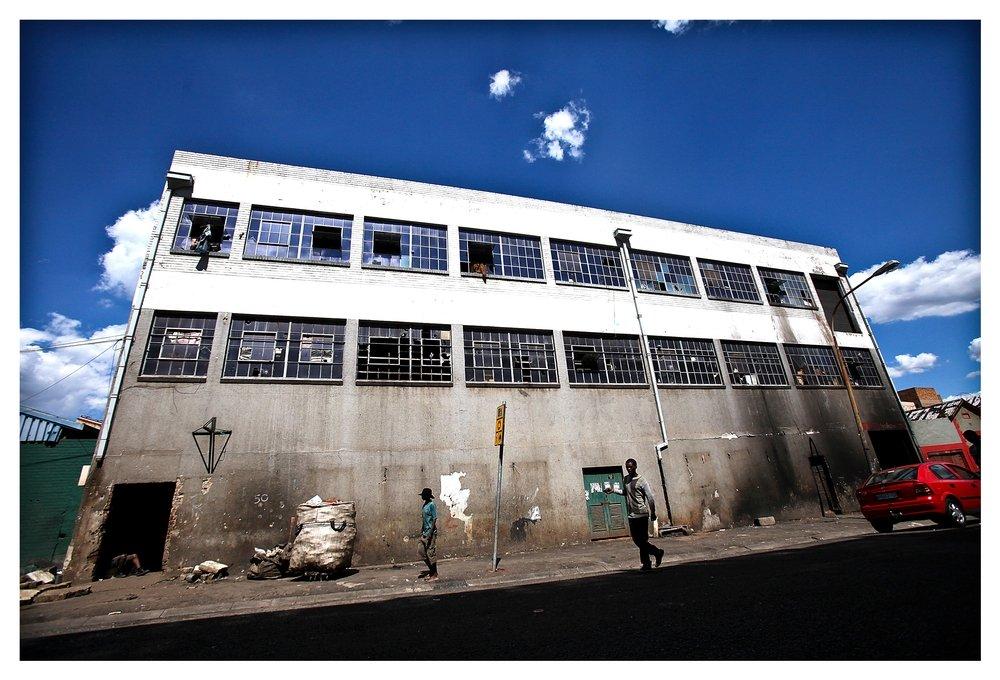
Johannesburg – Doctors Without Borders (MSF) is gravely concerned that South African authorities’ strategies to address migration do nothing to resolve the greater humanitarian crisis surrounding vulnerable migrants, refugees, and asylum seekers. Present South African strategies focus on forced evictions targeting migrant residents of Johannesburg slum buildings, and mass deportations of undocumented migrants from the country. However, the dynamics around survival migration are complex, requiring regional vision and proactive solutions to settle the regional crisis, which brought these migrants to settle in South Africa.
Survival migrants and asylum-seekers, in humanitarian distress, look to South Africa as a place of safety and stability, in contrast to the desperate contexts from which they flee (e.g. Zimbabwe, Somalia, or even other parts of South Africa). Gabriele Santi, MSF’s project coordinator in Johannesburg, where thousands of survival migrants live in impoverished inner city slums states:
“Vulnerable migrants have no choice but to leave their place of origin in a desperate search of a way to live and assist their families from afar. What they find in South Africa is exploitation, discrimination, poverty, destitution, and in the past have been met with xenophobic outbreaks of extreme violence. MSF staff have treated patients of rape, physical beatings, torture, burns, or who have been forced to commit such acts on other members of their groups.”
MSF has witnessed and documented appalling living conditions in Johannesburg’s inner city in the briefing paper, “Nowhere Else To Go”. These slum buildings are overcrowded, warren-like spaces, which lack proper waste and sewage management, often have unsanitary or inaccessible water, and little or no electricity. “Many migrants’ primary priorities are for daily survival,” says Santi. “Finding food, clothing, shelter and safety supersede other concerns, including health.”
Current strategies such as forced evictions and mass deportations, place already vulnerable migrants at greater risk. During a recent police eviction in Johannesburg’s winter, MSF distributed blankets and witnessed over 1,500 people trying to regain entry to their building to obtain belongings. Residents claimed that police used force, carried out the eviction with guns drawn and did not provide alternative options.
Such forced evictions in Johannesburg are unacceptable, inhumane actions, which cast vulnerable migrants out onto the streets. The deportation or forced return of these migrants back to the desperate regions that they originally fled is similarly irresponsible.
MSF’s new partnership with the City of Johannesburg Department of Health is a crucial first step addressing health gaps in migrant communities, ensuring integrated health services. This innovative partnership approach is an example of broader inter-organisation collaborations, which are needed to effectively address survival migration issues. Santi elaborates, “In all other refugee and asylum-seeking circumstances, the responsibilities are clear, but in this urban context locating solutions is more complicated. This requires flexibility and cooperation with other groups, including inter-governmental, national, municipal, non-governmental and civil society organisations.”
Survival migrants’ tenuous situation in South Africa, an unacceptable police campaign of forced residential evictions, and the rapidly approaching end of the moratorium on deportations for undocumented Zimbabwean migrants will push these people into even more desperate situations and negatively impact their health-seeking behaviour. MSF’s medical focal point in Johannesburg, Jacqueline Molopyane says, ““We know that with previous threats of deportation, migrants have gone underground, avoiding contact with any government officials and institutions. This has compromised their access to health care, leading to poor or non adherence to chronic medication such as treatment for HIV and tuberculosis.”

MSF calls for the Government of South Africa to extend the moratorium on deportations, and seek a humane and comprehensive solution to appropriately address the needs of vulnerable survival migrants and asylum seekers. MSF demands an immediate end to the irresponsible and inhumane police tactics of forced evictions, which place vulnerable migrants at life risk, and calls for other actors to focus their attention on this pending crisis.
Download report:
Nowhere else to go
Video: Lives of vulnerabe
migrants in South Africa
Kenneth M Tong, Operational Communications Advisor, kenneth.tong@msf.org, Mobile: +27 (0)82 852 1886
Kate Ribet, Communications Officer, kate.ribet@joburg.msf.org, Mobile +27 (0)79 872 2950
MSF is an international, independent, medical humanitarian organisation, which delivers emergency aid to people affected by armed conflict, epidemics, healthcare exclusion and environmental disasters. MSF has worked in South Africa since 1999, and has provided medical and humanitarian assistance to survival migrants since 2007.
